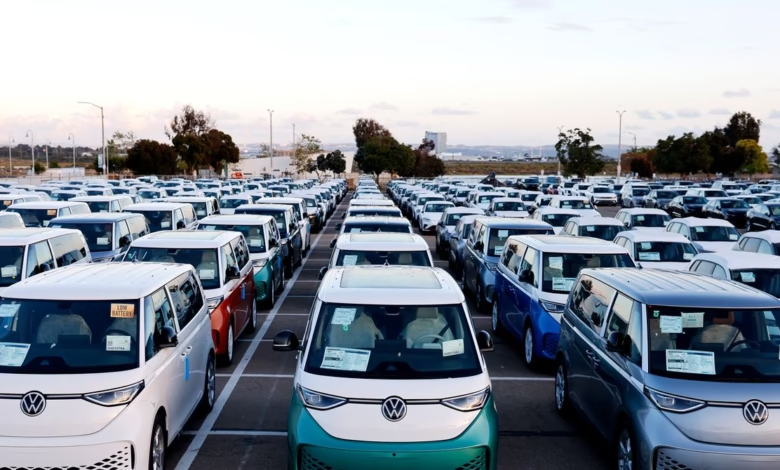Trump’s Plan to Scrap California Emissions Rules: EV Impact

▼ Summary
– President Trump signed resolutions to revoke California’s authority to set its own vehicle emissions rules, targeting its 2035 gas-powered car ban.
– California’s emissions standards influence nearly a third of US car sales, with one in four vehicles sold there being electric or hybrid.
– The federal move, alongside other policies like rolling back fuel standards and EV tax credits, could dampen consumer interest in electric vehicles.
– California sued the federal government, arguing the legal theory used to revoke its waiver authority is unprecedented and legally flawed.
– US EV market uncertainty has slowed growth, causing automakers to face unprecedented volatility in product strategy, with fewer new models planned.
The Trump administration has launched a direct challenge to California’s long-standing authority over vehicle emissions standards, targeting the state’s ambitious plan to phase out gas-powered cars by 2035. During a Washington ceremony attended by trucking industry leaders, the president signed congressional resolutions designed to strip California of its unique regulatory power, a move that could reshape the future of electric vehicles in America.
California’s emissions rules, adopted by ten other states, influence nearly a third of all new car sales nationwide. The state has become a driving force in electrification, with one in four vehicles sold there now being battery-electric or plug-in hybrids. While experts say this week’s action won’t immediately alter dealership inventories, it adds to growing uncertainty around federal EV policies. Recent moves, including weakened fuel economy standards, potential cuts to tax credits, and stalled charging infrastructure funding, risk dampening consumer enthusiasm for electric cars.
“Automakers plan production years in advance, but shifting political signals can sway buyer behavior,” notes Cara Horowitz, a climate policy expert at UCLA. Simon Mui of the Natural Resources Defense Council calls the administration’s actions “a major setback” for clean transportation efforts.
California swiftly filed a lawsuit in response, with Governor Gavin Newsom directing state agencies to reinforce zero-emission vehicle initiatives. The legal battle hinges on an unconventional Republican argument: that Congress can revoke California’s 1967 Clean Air Act waiver, which allows stricter state-level emissions rules. Legal experts question the maneuver’s validity, with California Attorney General Rob Bonta calling it “a fringe theory without precedent.”
Ten states, including New York and Massachusetts, joined California’s lawsuit as the broader EV market shows signs of strain. While U.S. electric vehicle sales continue growing, the pace has slowed—a trend analysts link to regulatory instability and trade policies. Bank of America recently warned of “historic uncertainty” for automakers, predicting fewer new models through 2029 as companies navigate conflicting state and federal demands.
The outcome of this clash could determine whether California retains its role as America’s de facto environmental regulator, or whether the federal government succeeds in recentralizing control over the auto industry’s electric future.
(Source: Wired)



